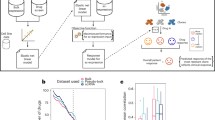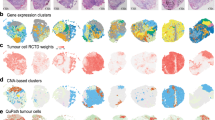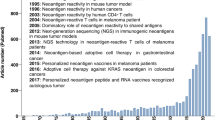Abstract
Tumor recurrence following treatment remains a major clinical challenge. Evidence from xenograft models and human trials indicates selective enrichment of cancer-initiating cells (CICs) in tumors that survive therapy. Together with recent reports showing that CIC gene signatures influence patient survival, these studies predict that targeting self-renewal, the key 'stemness' property unique to CICs, may represent a new paradigm in cancer therapy. Here we demonstrate that tumor formation and, more specifically, human colorectal CIC function are dependent on the canonical self-renewal regulator BMI-1. Downregulation of BMI-1 inhibits the ability of colorectal CICs to self-renew, resulting in the abrogation of their tumorigenic potential. Treatment of primary colorectal cancer xenografts with a small-molecule BMI-1 inhibitor resulted in colorectal CIC loss with long-term and irreversible impairment of tumor growth. Targeting the BMI-1–related self-renewal machinery provides the basis for a new therapeutic approach in the treatment of colorectal cancer.
This is a preview of subscription content, access via your institution
Access options
Subscribe to this journal
Receive 12 print issues and online access
$209.00 per year
only $17.42 per issue
Buy this article
- Purchase on Springer Link
- Instant access to full article PDF
Prices may be subject to local taxes which are calculated during checkout






Similar content being viewed by others
References
Dick, J.E. Stem cell concepts renew cancer research. Blood 112, 4793–4807 (2008).
O'Brien, C.A., Pollett, A., Gallinger, S. & Dick, J.E. A human colon cancer cell capable of initiating tumour growth in immunodeficient mice. Nature 445, 106–110 (2007).
Ricci-Vitiani, L. et al. Identification and expansion of human colon-cancer–initiating cells. Nature 445, 111–115 (2007).
Dalerba, P. et al. Phenotypic characterization of human colorectal cancer stem cells. Proc. Natl. Acad. Sci. USA 104, 10158–10163 (2007).
Bao, S. et al. Glioma stem cells promote radioresistance by preferential activation of the DNA damage response. Nature 444, 756–760 (2006).
Li, X. et al. Intrinsic resistance of tumorigenic breast cancer cells to chemotherapy. J. Natl. Cancer Inst. 100, 672–679 (2008).
Tehranchi, R. et al. Persistent malignant stem cells in del(5q) myelodysplasia in remission. N. Engl. J. Med. 363, 1025–1037 (2010).
Majeti, R. et al. CD47 is an adverse prognostic factor and therapeutic antibody target on human acute myeloid leukemia stem cells. Cell 138, 286–299 (2009).
Todaro, M. et al. Colon cancer stem cells dictate tumor growth and resist cell death by production of interleukin-4. Cell Stem Cell 1, 389–402 (2007).
Kreso, A. et al. Variable clonal repopulation dynamics influence chemotherapy response in colorectal cancer. Science 339, 543–548 (2013).
Singh, S.K. et al. Identification of human brain tumour initiating cells. Nature 432, 396–401 (2004).
Al-Hajj, M., Wicha, M.S., Benito-Hernandez, A., Morrison, S.J. & Clarke, M.F. Prospective identification of tumorigenic breast cancer cells. Proc. Natl. Acad. Sci. USA 100, 3983–3988 (2003).
O'Brien, C.A. et al. ID1 and ID3 regulate the self-renewal capacity of human colon cancer-initiating cells through p21. Cancer Cell 21, 777–792 (2012).
Park, I.K. et al. Bmi-1 is required for maintenance of adult self-renewing haematopoietic stem cells. Nature 423, 302–305 (2003).
Lessard, J. & Sauvageau, G. Bmi-1 determines the proliferative capacity of normal and leukaemic stem cells. Nature 423, 255–260 (2003).
Molofsky, A.V. et al. Bmi-1 dependence distinguishes neural stem cell self-renewal from progenitor proliferation. Nature 425, 962–967 (2003).
Sparmann, A. & van Lohuizen, M. Polycomb silencers control cell fate, development and cancer. Nat. Rev. Cancer 6, 846–856 (2006).
Sauvageau, M. & Sauvageau, G. Polycomb group proteins: multi-faceted regulators of somatic stem cells and cancer. Cell Stem Cell 7, 299–313 (2010).
Sangiorgi, E. & Capecchi, M.R. Bmi1 is expressed in vivo in intestinal stem cells. Nat. Genet. 40, 915–920 (2008).
Tian, H. et al. A reserve stem cell population in small intestine renders Lgr5-positive cells dispensable. Nature 478, 255–259 (2011).
Bruggeman, S.W. et al. Bmi1 controls tumor development in an Ink4a/Arf-independent manner in a mouse model for glioma. Cancer Cell 12, 328–341 (2007).
Leung, C. et al. Bmi1 is essential for cerebellar development and is overexpressed in human medulloblastomas. Nature 428, 337–341 (2004).
Shimono, Y. et al. Downregulation of miRNA-200c links breast cancer stem cells with normal stem cells. Cell 138, 592–603 (2009).
Lukacs, R.U., Memarzadeh, S., Wu, H. & Witte, O.N. Bmi-1 is a crucial regulator of prostate stem cell self-renewal and malignant transformation. Cell Stem Cell 7, 682–693 (2010).
Dovey, J.S., Zacharek, S.J., Kim, C.F. & Lees, J.A. Bmi1 is critical for lung tumorigenesis and bronchioalveolar stem cell expansion. Proc. Natl. Acad. Sci. USA 105, 11857–11862 (2008).
Chiba, T. et al. The polycomb gene product BMI1 contributes to the maintenance of tumor-initiating side population cells in hepatocellular carcinoma. Cancer Res. 68, 7742–7749 (2008).
Abdouh, M. et al. BMI1 sustains human glioblastoma multiforme stem cell renewal. J. Neurosci. 29, 8884–8896 (2009).
Kim, J.H. et al. The Bmi-1 oncoprotein is overexpressed in human colorectal cancer and correlates with the reduced p16INK4a/p14ARF proteins. Cancer Lett. 203, 217–224 (2004).
Li, D.W. et al. Expression level of Bmi-1 oncoprotein is associated with progression and prognosis in colon cancer. J. Cancer Res. Clin. Oncol. 136, 997–1006 (2010).
Du, J., Li, Y., Li, J. & Zheng, J. Polycomb group protein Bmi1 expression in colon cancers predicts the survival. Med. Oncol. 27, 1273–1276 (2010).
Tateishi, K. et al. Dysregulated expression of stem cell factor Bmi1 in precancerous lesions of the gastrointestinal tract. Clin. Cancer Res. 12, 6960–6966 (2006).
Vermeulen, L. et al. Wnt activity defines colon cancer stem cells and is regulated by the microenvironment. Nat. Cell Biol. 12, 468–476 (2010).
Dylla, S.J. et al. Colorectal cancer stem cells are enriched in xenogeneic tumors following chemotherapy. PLoS ONE 3, e2428 (2008).
Wang, J.C. Evaluating therapeutic efficacy against cancer stem cells: new challenges posed by a new paradigm. Cell Stem Cell 1, 497–501 (2007).
Kvinlaug, B.T. & Huntly, B.J. Targeting cancer stem cells. Expert Opin. Ther. Targets 11, 915–927 (2007).
Trumpp, A. & Wiestler, O.D. Mechanisms of disease: cancer stem cells—targeting the evil twin. Nat. Clin. Pract. Oncol. 5, 337–347 (2008).
Liu, S. & Wicha, M.S. Targeting breast cancer stem cells. J. Clin. Oncol. 28, 4006–4012 (2010).
Diehn, M., Cho, R.W. & Clarke, M.F. Therapeutic implications of the cancer stem cell hypothesis. Semin. Radiat. Oncol. 19, 78–86 (2009).
Kreso, A. & O'Brien, C.A. Colon cancer stem cells. Curr. Protoc. Stem Cell Biol. 7, 3.1 (2008).
Hu, Y. & Smyth, G.K. ELDA: extreme limiting dilution analysis for comparing depleted and enriched populations in stem cell and other assays. J. Immunol. Methods 347, 70–78 (2009).
Amendola, M., Venneri, M.A., Biffi, A., Vigna, E. & Naldini, L. Coordinate dual-gene transgenesis by lentiviral vectors carrying synthetic bidirectional promoters. Nat. Biotechnol. 23, 108–116 (2005).
Voorhoeve, P.M. & Agami, R. The tumor-suppressive functions of the human INK4A locus. Cancer Cell 4, 311–319 (2003).
Acknowledgements
We thank R. Lopez and P. Lo from the Animal Research Centre, University Health Network and A. Khandani, P. Penttila, and S. Zhao from the Sickkids Flow Cytometry facility for their skillful assistance. We are grateful to all members of the Dick lab, especially M. Anders, E. Laurenti, N. Mbong, S. Doulatov, M. Milyavsky and F. Notta, as well as C. Gedye and J. Wang for their advice and critical comments. We thank E. Lechman (University Health Network, Toronto), J. Moffat (University of Toronto) and T. Chiba (Chiba University) for lentiviral vectors expressing shRNAs to BMI1. We also thank members from the Department of Pathology (Toronto General Hospital), including F. Meng, M. Sukhram, V. Son, H. Begley and P. Shaw, for providing colon cancer samples. This work was supported by funds to PTC Therapeutics from the Wellcome Trust and to J.E.D. from Genome Canada through the Ontario Genomics Institute, Ontario Institute for Cancer Research and a Summit Award with funds from the province of Ontario, the Canadian Institutes for Health Research, a Canada Research Chair, the Princess Margaret Hospital Foundation and funds to E.L.-F. by Fonds National de la Recherche, Luxembourg and the Marie Curie Actions of the European Commission (FP7-COFUND, PDR 2012-2 4735314). This research was funded in part by the Ontario Ministry of Health and Long Term Care (OMOHLTC). The views expressed do not necessarily reflect those of the OMOHLTC.
Author information
Authors and Affiliations
Contributions
A.K., C.A.O., J.E.D. designed the study. A.K., P.v.G., N.M.P., E.L.-F., C.F., L.G., Y.W., C.L. and C.A.O. performed experiments. N.N.I. and C.H.A. supervised specific experiments. T.D., L.C., R.B., W.D., N.S. and Y.-C.M. provided BMI-1 inhibitor and performed experiments. E.S. assessed tumor histology. S.G. provided tumor specimens. A.K., P.v.G., C.A.O. and J.E.D. analyzed and interpreted data. P.v.G., C.A.O. and J.E.D. revised the paper. A.K. wrote the paper. J.E.D. supervised the study.
Corresponding author
Ethics declarations
Competing interests
The authors declare no competing financial interests.
Supplementary information
Supplementary Text and Figures
Supplementary Figures 1–19, Supplementary Tables 1–7, Supplementary Methods and Supplementary Results (PDF 8598 kb)
Rights and permissions
About this article
Cite this article
Kreso, A., van Galen, P., Pedley, N. et al. Self-renewal as a therapeutic target in human colorectal cancer. Nat Med 20, 29–36 (2014). https://doi.org/10.1038/nm.3418
Received:
Accepted:
Published:
Issue Date:
DOI: https://doi.org/10.1038/nm.3418
This article is cited by
-
Repurposing the dopamine transporter antagonist vanoxerine to treat colorectal cancer
Nature Cancer (2024)
-
Convergent TP53 loss and evolvability in cancer
BMC Ecology and Evolution (2023)
-
Ubiquitin-specific peptidase 5 facilitates cancer stem cell-like properties in lung cancer by deubiquitinating β-catenin
Cancer Cell International (2023)
-
Sam68 is a druggable vulnerability point in cancer stem cells
Cancer and Metastasis Reviews (2023)
-
Dormancy, stemness, and therapy resistance: interconnected players in cancer evolution
Cancer and Metastasis Reviews (2023)



